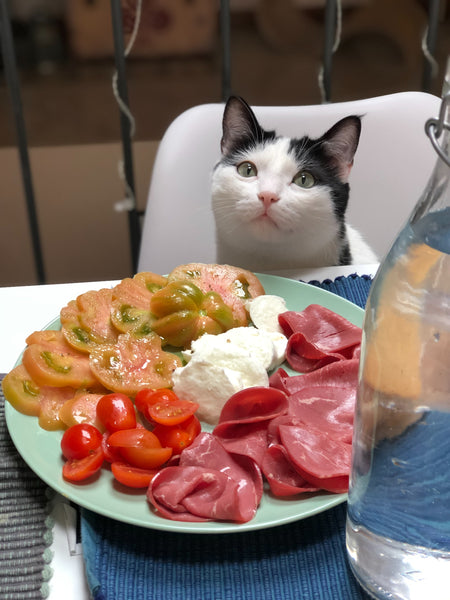It may be tempting to share table scraps with your cat as a tasty treat, or perhaps your curious kitty is prone to exploring your pantry. However, what’s good and healthy for us can be toxic for our furry friends.
Can cats eat chocolate? Can you and your kitty share popcorn while watching a movie? Can cats chew on bones like dogs do? Read on to learn about some common foods and ingredients that can be harmful to cats, no matter how good your intentions may be.
Understanding Your Cat’s Diet
Cats are obligate carnivores, meaning that meat-based proteins should make up the majority of your cat’s diet. Moderate amounts of fats and minimal amounts of carbohydrates are also ideal.
Your cat can get her nutrients through various combinations of dry food, wet food, and vet-approved supplements. Because cats are creatures of habit, they tend to be satisfied with the same food every day.
That being said, cats are also incredibly curious—new sights, smells, and textures found in the kitchen or on the dinner table can be very appealing. Unfortunately, if your cat tries the wrong food or ingredient, she could be in for serious discomfort. With that in mind, it’s important to know which foods should be kept out of reach at all times in order to keep your kitty feeling healthy.

Foods That Are Toxic to Cats
Cats are pretty self-sufficient when it comes to their health—they’re able to groom themselves for the most part, and tend to have a sense of when they’ve had enough food or catnip for one serving. However, this doesn’t always mean that cats know exactly what’s best for them. That enticing “treat” on the countertop could very easily contain ingredients that are toxic for your cats.
Foods to keep away from your kitty include:
Chocolate
Chocolate contains methylxanthines—theobromine and caffeine—which are incredibly toxic to pets. If your cat ingests these harmful substances, she can experience vomiting, diarrhea, muscle tremors, tummy troubles, and even seizures.
While dark chocolates are generally more harmful than white or milk chocolates, it’s best to keep your cat away from chocolate altogether. Coffee and other caffeinated beverages should also be avoided.
Yeast Dough
Yeast causes dough to rise—which is precisely what would happen in your kitty’s tummy if she happened to eat any bread dough containing yeast. This could lead to gas, bloating, and even potentially fatal twisting.
The good news, though, is that baked bread is considered safe for cats (although it does not provide any nutritional value).
Citrus Fruits
While oranges can be safe for cats in moderation, too much citric acid can cause digestive issues in cats. Avoid feeding your cat citrus fruits such as lemons, limes, and grapefruits; if you do decide to share a slice or two of an orange, be sure to remove the peel and seeds as an extra precaution.
Grapes and Raisins
Experts aren’t entirely sure of the reason why, but grapes and raisins can cause serious kidney problems in cats and dogs alike.
A cat who has ingested grapes or raisins may vomit repeatedly or show signs of hyperactivity within the first 12 hours; within 24 hours, she may experience more serious effects including diarrhea, abdominal discomfort, appetite loss, and lethargy.
Raw Eggs and Meat
If your cat eats raw eggs or raw meat, she runs the risk of contracting Salmonella or E. coli. Plus, she could transmit harmful bacteria to you or others in the home.
Additionally, keep your cat away from raw bones. In addition to potentially containing the same harmful bacteria, they could also be choking hazards; they could also crack and spinter, and cause damage to the teeth or intestines.
Alliums
Alliums—onions, garlic, shallots, scallions, and chives—can cause gastrointestinal problems for your cat. They could also damage the red blood cells, leading to lethargy, weakness, and appetite loss.
Avoiding feeding your cat any of these vegetables and herbs, including foods that contain them such as soups or garlic bread.
Additional foods and ingredients to keep away from your kitty include nuts, dairy, coconut, avocado, alcohol, Xylitol, and large amounts of salt. Try to keep your cat away from your dog’s food, too!

Keeping Your Cat Safe and Healthy
If you know or suspect that your cat has eaten something toxic, call your vet or poison control center as soon as possible, even if your cat isn’t showing any signs of illness. It’s better to be safe than sorry; the sooner you address any potential issues, the better.
Cat-proof your home by keeping human foods out of reach… keeping in mind that cats love to climb! Keep your cat away from tables and countertops while you’re cooking and eating, and resist the urge to feed her your tasty table scraps.
Promote healthy digestion, nutrient absorption, and a healthy immune response with PetHonesty’s Digestive Probiotics+ Powder for Cats. This delicious powder is made with natural ingredients, plus catnip to make it even more appealing!
Sources:
https://pets.webmd.com/cats/ss/slideshow-foods-your-cat-should-never-eat
https://www.dailypaws.com/cats-kittens/cat-nutrition/what-can-cats-eat/foods-toxic-to-cats
https://www.hillspet.com/cat-care/nutrition-feeding/toxic-foods-for-cats
https://www.aspca.org/pet-care/animal-poison-control/people-foods-avoid-feeding-your-pets













